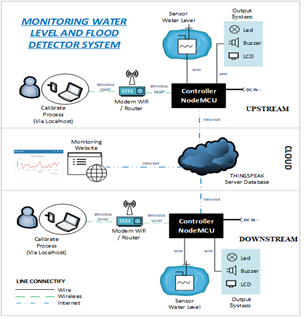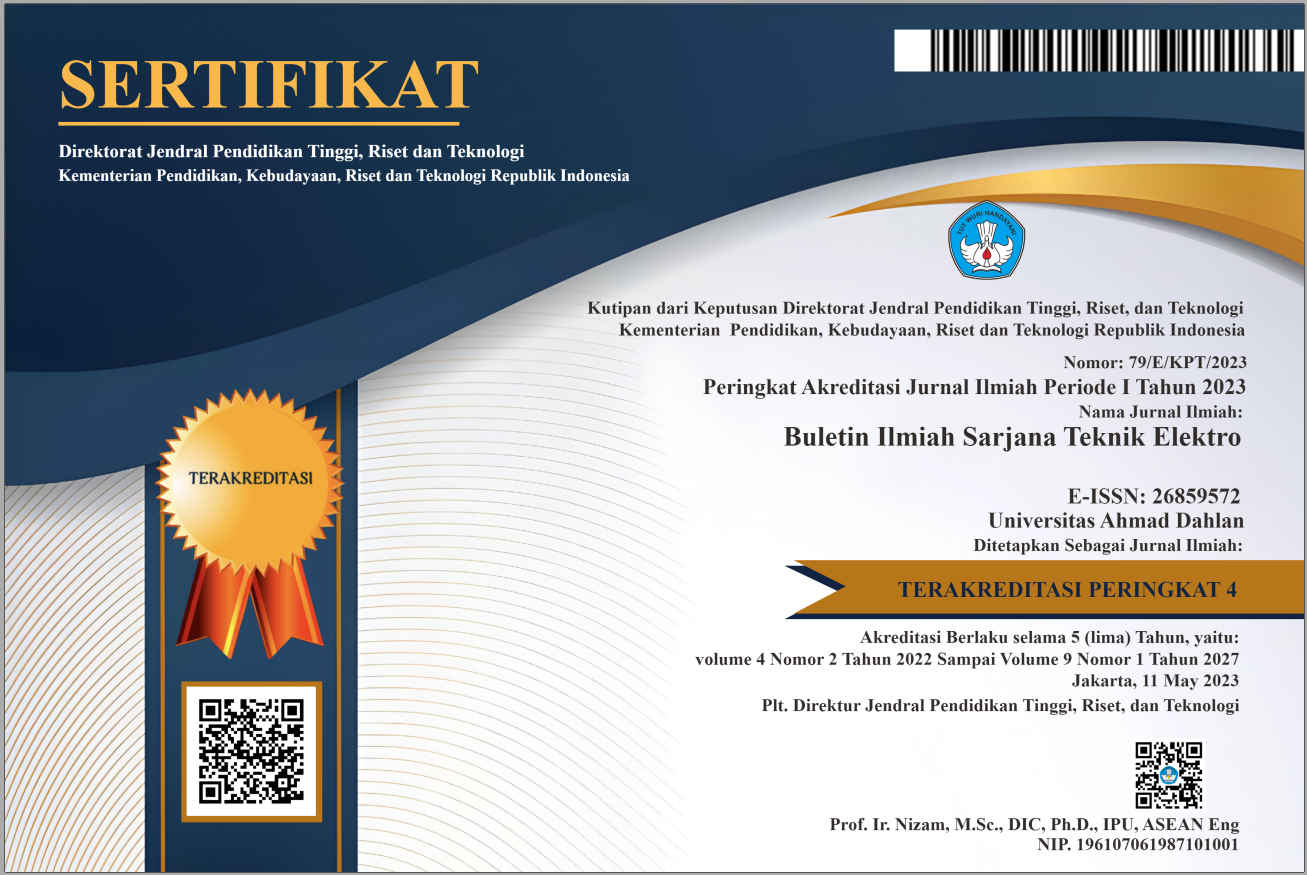Flood Detection Design based on the Internet of Things
DOI:
https://doi.org/10.12928/biste.v5i4.9209Keywords:
Flood, Water Level, Internet of Things, NodeMCU, Sensors, WebsiteAbstract
Flood detection devices and water levels from several previous research studies were not optimal because they were still running and manual information, such as through loudspeakers, in some research, electronic devices have been used, but no information has been obtained, and it is not optimal if there is a danger sign. So this research is a study on the development of an automatic flood detection system and water level based on the IoT (Internet of Things). The system uses a NodeMCU Esp8266 controller with a combination of potentiometer sensors mounted on a water-level mechanic and connected to the Thingspeak IoT platform. Based on the results of the analysis and testing that have been done, the system is designed to combine the previous research algorithms so that it works more optimally and is better. The flood detection system and water level are made in two parts: one is placed upstream and the other is placed downstream, where the devices are connected. The device will turn on a danger alert when the altitude percentage is more than 85% of the maximum height. The lag time in the upload and download process is included in the Fast category (≤10 seconds). The resulting information can be monitored through the media portal website.
References
W. W. Hassan, A. Z. Jidin, S. A. C. Aziz, and N. Rahim, “Flood disaster indicator of water level monitoring system,” Int. J. Electr. Comput. Eng, vol. 9, no. 3, pp. 1694-1699, 2019, https://doi.org/10.11591/ijece.v9i3.pp1694-1699.
S. I. Abdullahi, M. H. Habaebi, and N. Abd Malik, “Intelligent flood disaster warning on the fly: developing IoT-based management platform and using 2-class neural network to predict flood status,” Bulletin of Electrical Engineering and Informatics, vol. 8, no. 2, pp. 706-717, 2019, https://doi.org/10.11591/eei.v8i2.1504.
D. Satria, S. Yana, T. Hidayat, S. Syahreza, E. Yusibani, and R. Munadi, “Application of GSM communication system on flood alarm systems,” In Journal of Physics: Conference Series,vol. 1232, no. 1, p. 012023, 2019, https://doi.org/10.1088/1742-6596/1232/1/012023.
H. Malik and W. Zatar, "A Real-Time and Low-Cost Flash Flood Monitoring System to Support Transportation Infrastructure," 2020 IEEE 44th Annual Computers, Software, and Applications Conference (COMPSAC), pp. 1111-1112, 2020, https://doi.org/10.1109/COMPSAC48688.2020.0-115.
P. Barmpoutis, P. Papaioannou, K. Dimitropoulos, and N. Grammalidis, “A review on early forest fire detection systems using optical remote sensing,” Sensors, vol. 20, no. 22, p. 6442, 2020, https://doi.org/10.3390/s20226442.
M. Anbarasan, B. Muthu, C. B. Sivaparthipan, R. Sundarasekar, S. Kadry, S. Krishnamoorthy, and A. A. Dasel, “Detection of flood disaster system based on IoT, big data and convolutional deep neural network,” Computer Communications, vol. 150, pp. 150-157, 2020, https://doi.org/10.1016/j.comcom.2019.11.022.
E. Abana, C. V. Dayag, V. M. Valencia, P. H. Talosig, J. P. Ratilla, G. Galat, “Road flood warning system with information dissemination via social media”, International Journal of Electrical and Computer Engineering (IJECE), vol. 9, no. 6, pp. 4979-4987, 2019, https://doi.org/10.11591/ijece.v9i6.pp4979-4987.
H. Moorthy and R. Sukumar, "Advanced Bridge Monitoring System using Internet of Things," 2022 International Interdisciplinary Humanitarian Conference for Sustainability (IIHC), pp. 688-692, 2022, https://doi.org/10.1109/IIHC55949.2022.10060795.
Sulistyowati R., et al., “A river water level monitoring system using android-based wireless sensor networks for a flood early warning system,” Second International Conference on Electrical Systems, Technology and Information 2015 (ICESTI 2015). pp. 401-408, 2016, https://doi.org/10.1007/978-981-287-988-2_43.
M. J. Subashini, R. Sudarmani, S. Gobika and R. Varshini, "Development of Smart Flood Monitoring and Early Warning System using Weather Forecasting Data and Wireless Sensor Networks-A Review," 2021 Third International Conference on Intelligent Communication Technologies and Virtual Mobile Networks (ICICV), pp. 132-135, 2021, https://doi.org/10.1109/ICICV50876.2021.9388418.
A. M. Wahab and A. N. Muhamad Ludin, “Flood vulnerability assessment using artificial neural networks in Muar Region, Johor Malaysia,” In IOP Conference Series: Earth and Environmental Science, vol. 169, p. 012056, 2018, https://doi.org/10.1088/1755-1315/169/1/012056.
N. S. Romali, Z. Yusop, and A. Z. Ismail, “Application of Hec-Ras and Arc Gis for Floodplain Mapping in Segamat Town,” International Journal of GEOMATE, vol 14, no. 43, pp. 125-131, 2018, https://doi.org/10.21660/2018.43.3656.
M. Codo and M. A. Rico-Ramirez, “Ensemble radar-based rainfall forecasts for urban hydrological applications,” Geosciences, vol. 8, no. 8, p. 297, 2018, https://doi.org/10.3390/geosciences8080297.
S. I. Abdullahi, M. H. Habaebi, S. T. Gunawan, and M. R. Islam, “Miniaturized Water Flow and Level Monitoring System for Flood Disaster Early Warning,” In IOP Conference Series: Materials Science and Engineering, vol. 260, no. 1, pp. 1, 2019, https://doi.org/10.1088/1757-899X/260/1/012019.
S. I. Abdullahi, M. H. Habaebi, and N. A. Malik, “Flood Disaster Warning System on the go,” In 2018 7th International Conference on Computer and Communication Engineering (ICCCE), pp. 258-263, 2018, https://doi.org/10.1109/ICCCE.2018.8539253.
F. A. Silaban, S. Budiyanto, and W. K. Raharja, “Stepper motor movement design based on FPGA,” in International Journal of Electrical and Computer Engineering (IJECE), vol. 10, no. 1, pp. 151-159, 2020, https://doi.org/10.11591/ijece.v10i1.pp151-159.
J. Wu, H. Liu, G. Wei, T. Song, C. Zhang, and H. Zhou, “Flash flood forecasting using support vector regression model in a small mountainous catchment,” Water, vol. 11, no. 7, p. 1327, 2019, https://doi.org/10.3390/w11071327.
T. Zhao, B. Minsker, F. Salas, D. Maidment, V. Diev, J. Spoelstra, and P. Dhingra, “Statistical and Hybrid Methods Implemented in a Web Application for Predicting Reservoir Inflows during Flood Events,” JAWRA Journal of the American Water Resources Association, vol. 54, no. 1, pp. 69-89, 2018, https://doi.org/10.1111/1752-1688.12575.
F. Guzzetti, S. L. Gariano, S. Peruccacci, M. T. Brunetti, I. Marchesini, M. Rossi, and M. Melillo, “Geographical landslide early warning systems,” Earth-Science Reviews, vol. 200, p. 102973, 2020, https://doi.org/10.1016/j.earscirev.2019.102973.
Z. Z. Zulkifli, M. Mamat and H. T. Yew, "River Water Level Prediction for Flood Risk Assessment using NARX Neural Network," 2022 IEEE International Conference on Artificial Intelligence in Engineering and Technology (IICAIET), pp. 1-6, 2022, https://doi.org/10.1109/IICAIET55139.2022.9936739.
Q. Ke, et al., “Urban pluvial flooding prediction by machine learning approaches–a case study of Shenzhen city, China,” Advances in Water Resources, vol. 145, p. 103719, 2020, https://doi.org/10.1016/j.advwatres.2020.103719.
F. A.Silaban, S. Budiyanto, L. M. Silalahi, “Design of a conductive material detection system”, in International Journal of Robotics and Automation (IJRA), vol. 9, no. 4, pp. 292-299, 2020, https://doi.org/10.11591/ijra.v9i4.pp292-299.
H. Yuliandoko, Subono, V. A. Wardhany, S. H. Pramono and P. Siwindarto, “Design of flood detection system based on velocity and water level sensor in Arduino with SWOD application on Kalimati-Kretek Gantung DAM Banyuwangi,” In IOP Conference Series: Materials Science and Engineering, vol. 403, no. 1, p. 012066, 2018, https://doi.org/10.1088/1757-899X/403/1/012066.
M. H. A. Abdullah, M. Othman, S. Kasim, S. A. Mohamed, “Evolving spiking neural networks methods for classification problem: a case study in flood events risk assessmen”, International Journal of Electrical and Computer Engineering (IJECE), vol. 16, no. 1, pp. 222-229, 2019, https://doi.org/10.11591/ijeecs.v16.i1.pp222-229.
J. G. Natividad and J. M. Mendez, “Flood monitoring and early warning system using ultrasonic sensor,” In IOP conference series: materials science and engineering, vol. 325, no. 1, p. 012020, 2018, https://doi.org/10.1088/1757-899X/325/1/012020.
J. G. Natividad and J. M. Mendez, “Flood monitoring and early warning system using ultrasonic sensor,” In IOP conference series: materials science and engineering, vol. 325, no. 1, p. 012020, 2018, https://doi.org/10.1088/1757-899X/325/1/012020.
P. Kumar, M. Tripathi, A. Nehra, M. Conti and C. Lal, "SAFETY: Early Detection and Mitigation of TCP SYN Flood Utilizing Entropy in SDN," in IEEE Transactions on Network and Service Management, vol. 15, no. 4, pp. 1545-1559, 2018, https://doi.org/10.1109/TNSM.2018.2861741.

Published
How to Cite
Issue
Section
License
Copyright (c) 2023 Freddy Artadima Silaban, Yufimar Taufiq, Lukman Medriavin Silalahi, Grace Lamudur Arta Sihombing

This work is licensed under a Creative Commons Attribution-ShareAlike 4.0 International License.
Authors who publish with this journal agree to the following terms:
- Authors retain copyright and grant the journal right of first publication with the work simultaneously licensed under a Creative Commons Attribution License that allows others to share the work with an acknowledgment of the work's authorship and initial publication in this journal.
- Authors are able to enter into separate, additional contractual arrangements for the non-exclusive distribution of the journal's published version of the work (e.g., post it to an institutional repository or publish it in a book), with an acknowledgment of its initial publication in this journal.
- Authors are permitted and encouraged to post their work online (e.g., in institutional repositories or on their website) prior to and during the submission process, as it can lead to productive exchanges, as well as earlier and greater citation of published work (See The Effect of Open Access).
This journal is licensed under a Creative Commons Attribution-ShareAlike 4.0 International License.


